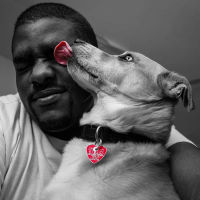FYI: If you buy something through a link on this site I may earn a commission - at NO extra cost to you.
Canine Skin Allergies 101
Canine skin allergies make your pet itchy and miserable, when that happens you're miserable too!
A lot of different things can cause dog skin allergy symptoms, or put a dog at a higher risk of developing allergies. These include:
- Seasonal allergies, dust or mold
- Dog food ingredients, or something in his favorite treats
- Parasites such as fleas
- Chemicals in cleaning products or yard treatments
- Poor breeding or poor diet
Although some allergies might cause your pup to sneeze or cough, the most common symptom of an allergic reaction to ANYTHING (whether it's eaten, inhaled, touched or whatever) is skin irritation and inflammation.
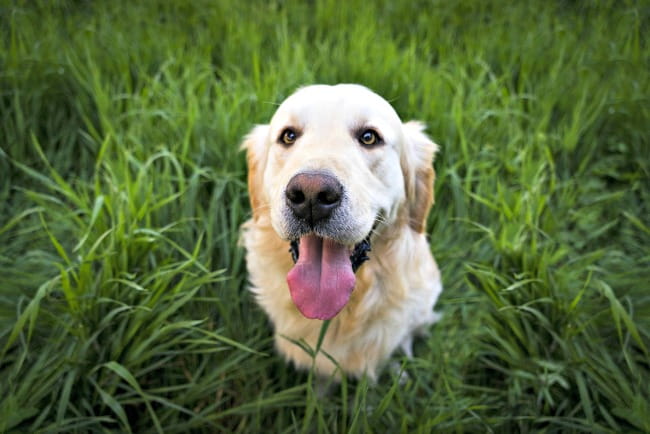
Removing the allergen is the only way to 'cure' the problem, so it's really important to take the time to figure out the root cause of your dogs allergy symptoms.
This can take some time (and a fair amount of 'detective work') meanwhile your poor pup is still itchy and uncomfortable - so finding ways to reduce his body's over-reaction and soothe his skin during this period is also important.
- About Dog Allergies
- Symptoms of Dog Allergies
- Inhalant Allergies
- Flea Allergies
- Food Allergies
- Contact Allergies
- Treating Skin Allergies
About Allergies in Dogs
Although any dog breed can have experience an allergic reaction, there are certain dog breeds that seem to be predisposed to canine allergies, these include :
- Beagles
- Boxers
- Bulldogs
- Cocker Spaniels
- Collies
- Dalmatians
- Golden Retrievers
- Irish Setters
- Labrador Retrievers
- Lhasa Apsos
- Poodles
- Pugs
- Rottweilers
- Schnauzers
- Shih Tzus
- Terriers
Poor breeding practices, inadequate nutrition and a lack of proper veterinary care can also put puppies and dogs at a higher risk of developing allergies (among other things) due to a weakened immune system and genetic predisposition.
Allergies are more likely to be seen in dogs who are over a year old, and the risk tends to increase as they grow older.
The main exception to this is when the allergic reaction is in response to vaccination. Puppies need a lot of puppy shots in the early months and so they are more at risk of having an adverse reaction than older dogs are.
Research has shown that puppies tend to 'grow into' their allergies as they mature due to their increasing exposure to allergens in dog food ingredients, their environment, vaccinations etc. They become sensitized to these substances as their exposure to them increases.
Symptoms Of Canine Skin Allergies
The most common signs of an allergic skin response in dogs include:
- Excessive scratching
- Licking/biting/chewing at legs, feet, tail, belly
- Patches of red, irritated skin. May be swollen, scabbed or hot
- A rash, often on belly and/or thighs
- Repeated head shaking, or scratching/pawing at his ears
- Patches of thickened, greasy skin
Depending on exactly what it is that your pup is allergic to, he may have one, several, or even all (poor baby!) of the above symptoms.
Generally there is a subtle difference between symptoms depending on what is triggering them, but itchy skin, hot spots, excessive licking/biting and ear problems can be seen with all types of allergies in dogs.
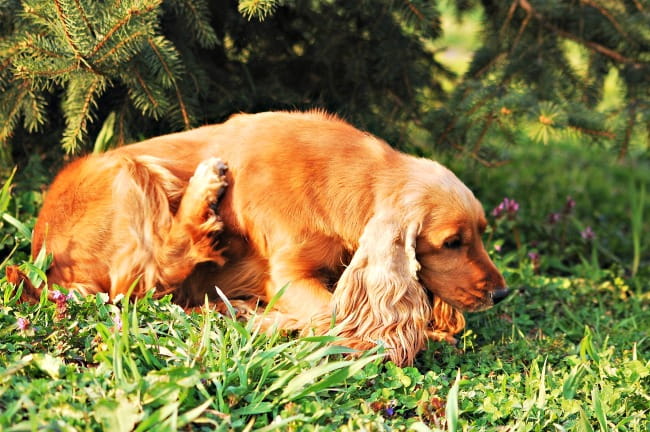
Inhalant Allergies in dogs
Dogs can be allergic to stuff they breathe in, just like humans. Pollen, mold and dust are the most common culprits. This type of allergic reaction is called Atopic Dermatitis and can cause some serious discomfort.
Common symptoms of atopic dermatitis in dogs include:
- Itching especially of the face, armpits, legs, groin, paws and rear/rump
- Patches of thick, reddened, greasy-looking skin.
- Excessive scratching, biting and licking at his skin
All the biting and licking your dog does to the irritated areas can cause further inflammation and lead to raw patches and hot spots. These areas are then at risk of becoming infected or turning into moist dermatitis.
If your dog's inhalant allergy symptoms are seasonal, then pollen is a likely culprit because dust or mold is more likely to result in consistent, year round allergy symptoms.
These types of allergies tend to appear in dogs over two years old.
If your dog has a chronic cough or sneezing, or you notice any difficulty breathing or discharge from eyes or nose, have him examined by a veterinarian to make sure that it is an allergy that is causing the problem and discuss treatment options if necessary.
You can give Benadryl to your dog to help reduce symptoms related to seasonal or inhalant allergies, but it's vital to use the right type of benadryl and the correct dosage. You can find out more about this HERE.
Flea Allergies in dogs
Many dogs are allergic to flea saliva, and react by developing Flea Allergy Dermatitis. This is actually the most common canine skin allergy and can cause very severe itching and discomfort. It's found in puppies and dogs of all ages.
Common symptoms of a flea allergy dermatitis in dogs include:
- Intense and chronic scratching, licking, biting at the skin
- Hot spots (areas of red/raw/hot skin which may be scabby/scaly)
- Patchy hair loss, often around the hot spots
The itching may be especially strong in the warm, moist areas where skin is easily accessible. These include the groin, armpits and belly but fleas can (and will) bite anywhere and tend to congregate around the neck/ears and tail/rump. This rear end area is often a site of inflammation and hot spots when flea allergy dermatitis is the problem.
Because there is very intense itching with hot spots, sometimes secondary infections can start up because your pup scratches/bites at himself so intensely.
Symptoms of an infection in a hot spot or on irritated skin include:
- Swelling
- Feels hot to the touch and looks warm
- Pus or yellow fluid
Dog Food Allergies
Certain ingredients in dog food or treats can cause an allergic response, and this type of allergy is becoming more common.
The type of dog food allergy we're talking about here is not the same as a anaphylactic type of reaction which causes swelling, breathing difficulties and can be fatal (think peanut allergy in humans). It's also not the same as a dog food intolerance, which is likely to cause digestive upset such as diarrhea and/or vomiting.
An allergic response to ingredients in dog food, or treats, isn't life threatening and causes skin symptoms and ear problems.
The most common signs of a dog food allergy include:
- Generalized itchy skin
- Patchy hair loss
- Itchy, inflamed ears
- Recurring ear infections
This won't be a seasonal problem, but will be present year round (unless of course it's related to a treat or food that your pup isn't eating regularly).
Dog food allergies can appear very suddenly, at any age, and are usually a reaction to a food that the pup/dog has been eating for some time.
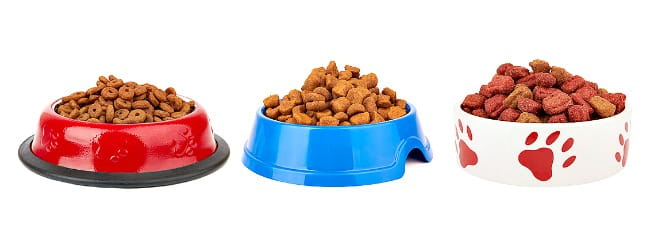
Find out what what foods are most likely to trigger allergies, how to help your dog if he has food allergies (and how to avoid them in the first place) HERE
There is another type of skin problem which can be related to a dog's diet, it's called Nutritional Dermatitis and happens as a result of poor or inadequate nutrition. Our dogs can't maintain a healthy coat and skin condition without the correct nutrients, and this can lead to chronically dry, itchy skin and a dull, dry coat and/or hair loss.
Nutritional dermatitis and dog food allergies can happen at the same time and are more often seen when a dog is fed a generic, low quality food.
Contact Allergies in dogs
This type of allergy is the least common in dogs, but it can happen. It's known as Environmental Dermatitis, or Contact Dermatitis. Basically the allergic response can happen as a response to your dog's skin coming in contact with something in his environment. It could be a natural element such as grass, an insect sting or bite, a chemical such as a fertilizer or floor cleaner, carpeting and so on.
Symptoms of contact or environmental dermatitis in dogs include:
- Swelling
- Hives
- Redness
- Rash or skin irritation
The reaction is usually localized to the area which has come in contact with the allergen, eg. if it's an allergic reaction to his new collar, then the irritation will be around his neck.
Sometimes dogs can be allergic to fertilizers, weedkillers or carpet shampoos which can all cause red, itchy possibly swollen paws.
If your female dog squats low to the ground to pee, this type of irritation can show up around the vulva.
These symptoms can come on very suddenly, and occur at any age.
Although a rash can appear with some dog skin allergies, it's more likely to be a symptom of other conditions including:
Treating Canine Skin Allergies
The good news is that there are lots of ways to treat the symptoms of dog allergies, and to reduce the itching, inflammation and general discomfort that your puppy or dog is feeling.
Veterinary Treatment Options
Your veterinarian can prescribe antihistamines and give them either as a shot or an oral medication. Or sometimes both.
If there's a lot of swelling or inflammation, he might also prescribe a course of corticosteroids (can also be given as a shot), and if there are signs of infection caused by constant licking, scratching or biting, then an antibiotic can be given as well.
Getting the correct treatment for your dog is hugely important because allergies can make him miserable, and can lead to more serious issues such as infection.
BUT, it's also vital to identify the type of allergy and the individual trigger (or triggers) for his symptoms. Your veterinarian can also help with that.
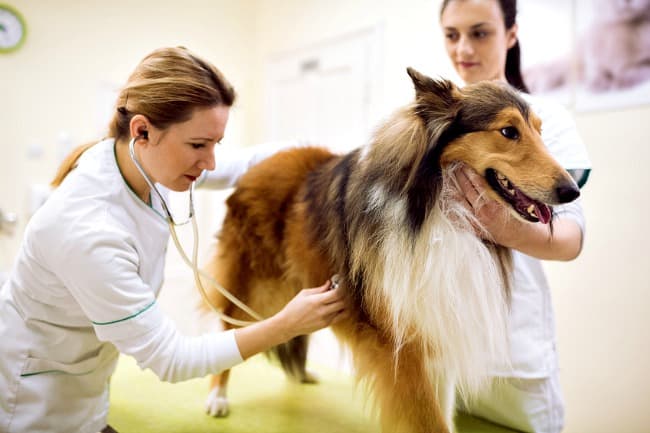
environment control & lifestyle
Finding and eliminating the source of your dog's allergies is the only surefire way to cure them. However, even if this seems impossible (eg. it's impossible to avoid pollen completely) you can reduce the severity of his symptoms by controlling and allergy-proofing his environment as much as possible.
Indoor allergens can be reduced by using a powerful vacuum with a HEPA filter (there are some great vacuums designed especially for homes with pets). Also using HEPA filters in your A/C unit and changing them regularly can cut down on dust, mites, mold and dander pretty significantly.
Although we can't clean the outdoor air, on windy, poor air quality or high pollen days keep your dog indoors as much as possible and don't go on hikes through long grass or wooded areas.
Skin problems caused by fleas can be eradicated by killing all the fleas, larvae and eggs both on your dog, and in his environment. There are a whole host of very effective flea and tick preventatives on the market for both your dog and your home. I'd recommend researching them and discussing options with your veterinarian as some of them contain some pretty powerful chemicals and you want to make sure you get the right product for your dog. Don't use OTC spot-on, or other types, of flea treatments as they're generally not very effective and can even be dangerous to your pet.
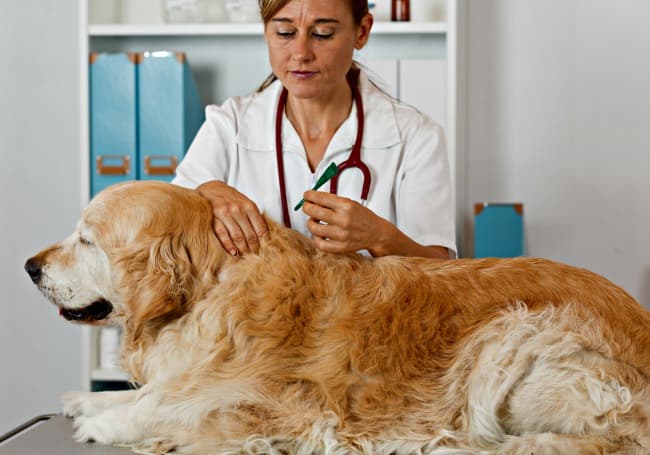
For minor infestations, natural flea control can work well, and can also be used as an alternative option for maintaining a flea-free dog and home after veterinary treatment has dealt with the initial problem.
When it comes to dog food allergies, changing your dog's diet is crucial. Try a food that is specifically designed for dogs with sensitive tummies such as a hypoallergenic formula, or look at grain-free options. Make sure that the food you choose contains totally different ingredients to the current food and avoid common allergy-triggering ingredients such as wheat, corn, soy, dairy, eggs and artificial additives, colors and junk/fillers. It can take at least six weeks for allergens already in your dog's bloodstream to clear his body so don't expect immediate results, be patient. If after six weeks you don't see any improvement you may need to look at doing an elimination diet.
With a contact allergy it's often easier to find out what's causing your pup's reaction because symptoms usually appear soon after the contact and are localized. For example, if your dog's paws are swollen, hot or red and he's licking them constantly chances are it's carpet, dirt, grass or some other floor/ground cover that's to blame.
OTC products for dog skin allergies
For mild to moderate dog skin allergy symptoms, there are many over-the-counter products and natural treatments that can help make Fido feel a whole lot more comfortable.
These are often best used alongside veterinary treatment, especially if symptoms are chronic or severe.
Some things you can do to help keep your dog's skin in good condition and reduce the occurrence of allergy induced symptoms include:
- Feeding a premium quality dog food
- Avoiding the ingredients/foods most likely to cause allergies
- Giving Omega-3 and Omega-6 supplements
- Using itch-soothing products
- Supporting your dog's immune system and function
There's a huge selection of products which have been designed to help relieve itching and dry skin conditions. These include shampoos, conditioners, hydrocortisone sprays, and a variety of natural products.
Over the years I've had some experience with dog skin allergies as two of my dogs have suffered from Atopic Dermatitis caused by seasonal allergies. I've used a combination of both veterinary treatment (including both allergy and steroid shots for one of my Rottweilers who had severe allergies every year) and over the counter anti-itch and natural products.
Shampoos & Sprays
Colloidal oatmeal shampoos are very soothing and I like both Burt's Bees Natural Oatmeal Shampoo and sulfate-free Petology Oatmeal & Honey shampoo. If your dog's skin is raw/red/sore due to bacterial or yeast infection (can happen as a result of excessive licking/scratching etc.) then a shampoo which contains Chlorhexidine is a good choice. It's a medicated shampoo with anti-yeast, anti-fungal and anti-bacterial properties. I've used Curaseb medicated shampoo (which also contains Ketoconazole and can be used to treat ringworm), and Micoseb medicated shampoo (which also contains Miconazole and can be used to treat mange and ringworm). Curaseb Medicated spray also comes is great for a more direct and targeted application to hot spots and irritated areas of skin.
Hydrocortisone sprays are very effective in reducing inflammation and redness, which helps alleviate itching. You can buy them from your veterinary clinic or OTC. You could try Nutri-Vet's Wellness Advanced Hydrocortisone spray or VetOne Hydrocortisone Topical.
supplements
There are several supplements and dietary additions you can use to help keep your dog's skin and coat healthy and support his immune system. The stronger his immune function the less at risk he is for allergies, and also the easier it will be for his body to deal with them should they occur.
Omega-6 and Omega-3 fatty acids are good for both your dog's skin and his coat, and it's important to make sure your dog's diet contains them both. Although they're added to many dog foods, Omega-3's break down quickly when exposed to air/light so supplementing with Omega-3 is the most important. Fish oils are a good source of Omega-3 and I like to use salmon oil, but I always make sure it's made from only wild-caught Alaskan salmon as that is the healthiest option. Grizzly Salmon Oil is my favorite but there are several different brands to choose from. If you prefer you can add flax seed oil or ground flax seeds to your dog's meals. Whole flax seeds aren't broken down well during the digestive process so I prefer to use ground seeds. I also always buy organic.
Probiotics are very important when it comes to keeping your dog's gut (and immune system) healthy. PetVitalityPRO chewable probiotic treats are a good choice, as are Proviable-DC capsules (add to food or hide in a tasty treat).
If you'd like to try a natural product to relieve your dogs skin allergy symptoms, check out PetAlive Allergy Itch Ease Granules, Vitality Science Blessed Relief for Dogs or Vet's Best Seasonal Allergy Relief chewables.
you might also like...
- Home
- Dog Health Information
- Canine Skin Allergies
FTC Disclosure: Some pages on this site contain affiliate links. I may earn on qualified purchases.


